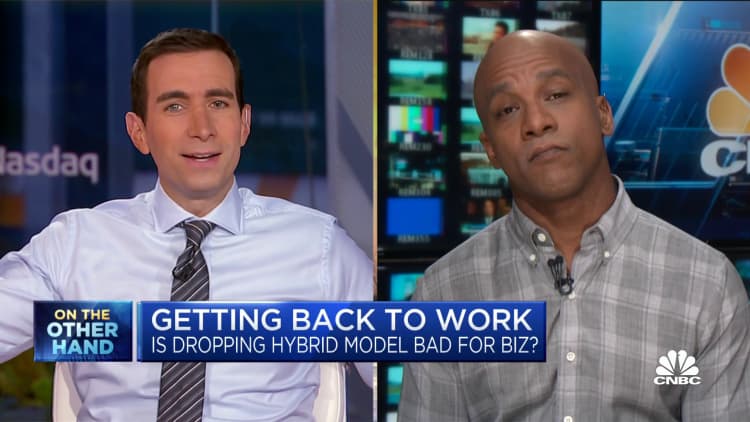Leopatrizi | E+ | Getty Images
In the headlines, the war for talent is still taking place on two fronts, with a hot labor market still tilted to job seekers even in a cooler economy, and companies testing the power they have post-pandemic to mandate a return to office.
On that second front, though, PWC U.S. Chairman Tim Ryan says the winner has already been declared.
“The war for talent is over. Talent won,” Ryan said at the CNBC Work Summit on Wednesday.
The PWC chairman’s view of this shift in the balance of power between management and labor is key coming from a firm with nearly 300,000 workers, over two-thirds of whom are millennials and represent a departure from the work paradigm built during the baby boomer and Gen X generations.
Companies are moving back to mandates, anywhere from two days to five days in the office citing the need for connection, but Ryan said what is important is redefining what connection means in the workplace, and mandates no longer make sense for today’s workforce.
“We’re seeing the best, most innovative companies doing that,” Ryan said of a more flexible approach to work location.
PWC announced in October 2021 its employees had the choice to work from anywhere, permanently.

Ryan said it won’t be an easy shift for many employers to accept because while the rhetoric of the American workplace has always focused on giving some choice to workers, the reality is that it’s long been designed to take away choice, Ryan said, citing examples including the idea of a 40-hour work week or Monday through Friday work week.
“Ultimately, what humans are telling us is they want choice. If we’re willing to redesign the way we do work, we can get the talent and get the work done and do it on our employees’ terms, which leads to better outcomes,” Ryan said. “It’s a different way of thinking and a fundamental, different skill that should drive better outcomes … [and] a happier, more engaged workforce.”
He said it’s important for companies to begin listening to their workers more because while in his view talent has won the war over choice, the war to attract top talent is likely to only increase.
“The pandemic took five million people out of the workforce over 55, and we’re seeing declining numbers of college enrollments all across the country,” Ryan said.
Many labor experts have cited the demographic challenges of the U.S. labor pool in the decades ahead with baby boomer retirements accelerating and less Americans coming up through the education system to replace them in the labor force.
Department of Labor Secretary Marty Walsh told CNBC Work on Tuesday that there is a “catastrophe” is coming for the economy and related to a depleted national workforce if the federal government fails to find a bipartisan fix for a broken immigration system.
PwC’s focus on what will be a persistent struggle for talent led it to implement a program to study how employees work and how to increase productivity.
“Happier, more satisfied people will do better work for their clients, if they’re feeling better about themselves,” Ryan said. “We’re changing and redesigning every single process within our organization to give people choice.”
This includes allowing employees to make choices on various elements of work, from where they work to how they work, the number of hours they work and what benefits they receive.
 EU News Digest Latest News & Updates
EU News Digest Latest News & Updates



